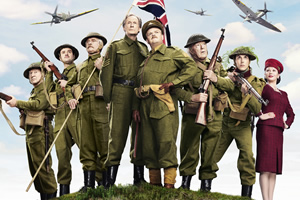Hamish McColl and Oliver Parker interview
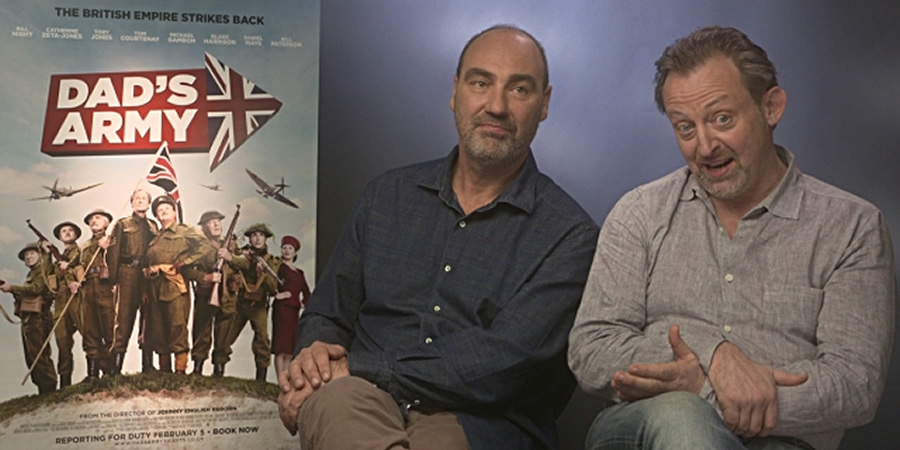
The new Dad's Army film is now in cinemas. After the premiere, BCG sat down with writer Hamish McColl and director Oliver Parker to talk about the challenges involved in reimagining the TV classic for present day audiences...
Hi gents. You've spoken in other interviews about how you wanted to bring the Dad's Army characters to a new generation. Do you have any sense yet about how they've been received?
Hamish: Not in any formal sense, but we've had a few screenings and our children have seen it, and other children have seen it, and we are confident that it operates as a family film. I watched the premiere with my 8 year-old, who had not seen it before... and - sure, he had to like it or he doesn't get back in the house, ha ha - but he loved it, and was rocking with laughter. He's too young to edit out criticism.
Oliver: My 14 year-old hasn't forgiven Hamish for writing in a real Mrs Mainwaring, but he saw the film and now understands. Not entirely forgiving, but he now understands...
Indeed, Hamish, you've written in much bigger roles for female characters, including giving Mrs Mainwaring an on screen role?
Hamish: Putting the women into the film is something I wanted to do from the beginning, to make Walmington a full and real place, and for the characters in the platoon to have real relationships.
With Elizabeth Mainwaring, some will think we have crossed a line by allowing people to see her, because she was famously the big sag in the mattress in the Anderson shelter, and only ever heard off camera. Felicity Montagu gives a great performance. I was interested in what was Mainwaring's relationship; what was his marriage like?
Also, at the core of my story is the arrival of this mysterious glamorous woman in town who turns the heads of the men who are late in their lives, long after their decisions are made about who they are with. Their beds are made, but she never the less ruffles their feathers...
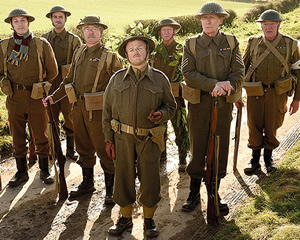
You've both previously worked on projects that involve bringing existing characters to the big screen. The Dad's Army characters are perhaps the most well-known though. Does that make it an easier or harder job?
Oliver: It may have been harder.
Hamish: Yeah, when you consider the amount of love for it...
Olly has described it as "the crown jewels of British comedy". Even touching them will, for some, be too much. There will people who prefer the TV series and wish we'd never done it... or been born in fact! And that's fine, the television series is there and it is wonderful and we love it ourselves, but I think there's room for a film, and that room I've found by going back to the characters... characters who are just so rich, and their relationships are just so strong, that there was more...
When we announced we were going to do the movie it was "oh no, how awful!". And then we cast the movie and it was "oh wonderful, who is going to play...?". Both of those reactions said it still mattered, it was still in the ether...
Oliver: The fact it was dangerous makes it interesting too. The fact that you are dealing with those things that people care so much about.
I thought it was slightly more difficult than, say, our other two: Paddington is a completely different medium you're working in, whilst for St. Trinian's it's a complete update, you're now looking at it from the girls' point of view.
Here we've got something that we're looking at in exactly the same period and keeping so many of the elements the same... That's a very delicate operation I would say. Some people say we haven't got it right, but so far a lot of people seem very welcome to the chance to re-visit some of those characters.
So, yes, it's felt difficult I'd say, but also its felt hugely rewarding because, I think, from the very origin of the script through to where we've ended up, I think there's not been a soupcon of cynicism in it. So that I'm pleased with.
Hamish: I think it's also worth saying we didn't make the movie looking over the fence at people's reactions. Olly and I have worked before in this kind of area and avoided the "oh god what are they all going to think" aspect - we know we've very much got to trust our instinct.
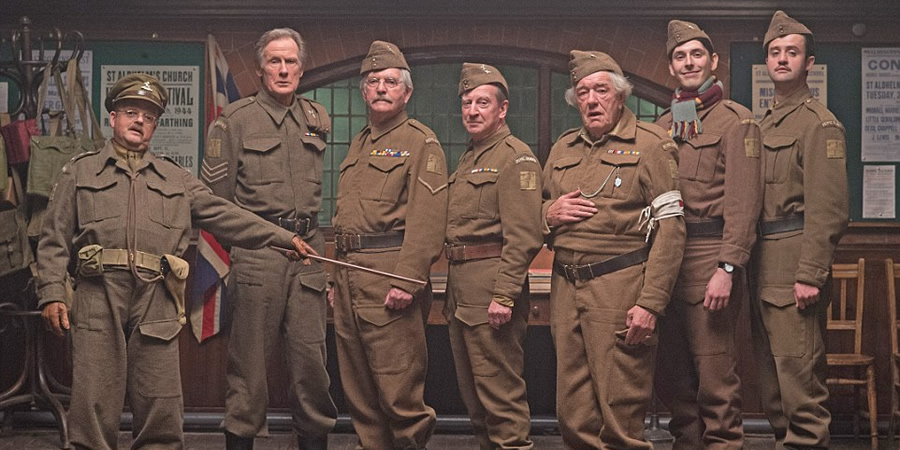
The movie looks set to do well at the box office, which will likely lead to the idea of making another film with the characters. Would you be up for it?
Oliver: Let's wait and see. I think it's a difficult one isn't it, because we never thought at all about it when we were making this one. You have to just take the ball when it's coming at you and take a swing - you can't look at the ball beyond that...
Hamish: A swingball analogy! You don't get many of those, ha ha!
Oliver:. Ha ha. It's certainly been wonderful to see how those characters have emerged through these performances. There's something almost frustrating - even though we've got this wonderful 90 minutes to work with - in fact that's not nearly enough when you've got someone like Blake Harrison, who is terrifically talented and got comedy right the way through him. He's got a few moments [in the film] and he makes them all as far as I'm concerned, but I'd love to just give him a hell of a lot more to do. That's the advantage of the TV series... they made 80 plus episodes, that's 40 hours... Maybe we should do a series of Dad's Army, that's never been done before has it?, ha ha.
Are there any other sitcoms you've consider giving the big screen treatment to?
Oliver: From my point of view, I tend not to think which is the one I'm going to do... because these have come to me. Most of the films I've made otherwise I've either dreamt up or developed, but these have come to me, and it's a reflection of the times.
You can't get movies financed sometimes unless there's a 'brand' attached to them, or you've got a massive cast.... it's really difficult to get it financed. So the thing you are most likely to get off the ground is something like this.
We've got loads of things we're developing. Before this I spent about 4 years trying to get a film made, a really great project and suddenly it disappeared, and I don't know what will happen to all that work. And then you get something like this, and even this was so hard to finance.
It's day to day in the British film industry, but I hope if this goes well it will encourage more adaptations because I don't feel at all snooty about the origins of these things, it's what you do with them.
So you're working on something else together?
Hamish: We kind of feel we've got unfinished business together, which is a way of saying I owe him money, ha ha. No, it's a relationship we enjoy and find creative.
Oliver: I think Hamish is incredibly talented and really funny... and a little bit bonkers. It's been a terrific relationship so far and I'll be damned if we don't find something else to do together.
A lot of your projects very much deal in British humour. Do you have a sense of how to actually define what is British comedy?
Oliver: I really enjoy the very particular character that is Mainwaring, who is also a bit Johnny English, in that he is the essence of a comic hero - someone who has an image of what they should be, but who is just not living up to it. That is a very particular type, and we'll see that all the way through: Fawlty, David Brent, Blackadder... these characters that are stuck in their social position wanting to achieve greater success and actually should probably be further down the pecking order. And class is definitely a big part of it, I know it was a big part of it in this script, wasn't it Hamish?...
Hamish: Yeah, it was. I absolutely adore the relationship between Mainwaring and Wilson and the inversion of class and the positions they hold in society. I think it's wonderful.
For me, mulling your question, I think of British comedy as a graph. The vertical is the man standing up and the horizontal line is the man flat on his face, and it's somewhere between those two you want to be - the man who aspires to be standing up, one who has a certain pretention like Mainwaring, or a certain pomposity like Fawlty.
The British are absolutely addicted to class, which is part of that, but they love to see that moment where that man moves from the vertical to the horizontal. Whether it's on a banana skin or a comeuppance, there's something rich about that. They can be wonderfully anarchic in that moment.
I think that's where all the unbuttoning happens to the British personality and you see the wildness that you see in Python, in crazy Milligan, Izzard... We have the ability within that framework to move into really technicolour lunacy. For foreigners looking at British comedy, they go "oh my god, this is very powerful stuff"... and, yet, we have all this buttoned up stuff too.
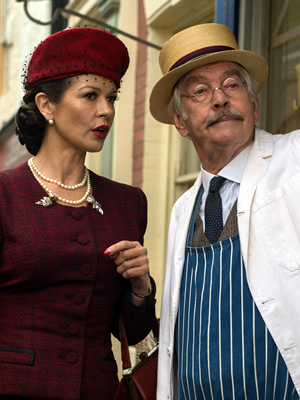
Oliver: There's something fascinating too about the creation of Dad's Army. A social structure that is completely fabricated: Mainwaring has made himself captain. He's not been officially nominated by anybody, he's grabbed that job; so all his power and pomposity is on hot air! So, the fabrication of that social structure is an illusion - there's a lot of comic energy behind that, waiting for it to burst.
You mentioned how foreigners view British comedy. Did you have an eye on the American market when making this film?
Hamish: I think we made a standalone movie, you don't need to have seen the TV series... indeed, there were people at the premiere who had never seen the TV series - their reactions were fascinating! It stands alone and works like that, but we never targeted it towards an American market, or any other.
Oliver: But you don't want to close doors to it either. That's the wonderful thing about having Catherine Zeta-Jones in the cast, because she works on both sides. She's not exactly 'a girl from the valleys', but she is a girl from the valleys too.
It'd be great to see its life overseas. It's very idiosyncratic, but there is something that is universal in it, and I guess that's what we were trying to tap. That universal notion that however aged or ridiculous you may be, you are committed to trying to do your best, to trying to do your bit for the country - there's something that's very tender in that.
For me the delight - if one is allowed to take any success from things - is that, when watching your film, you go "actually what I love about it is there's something really touching about it." That's in the original creation, that we are entirely pillaging... but trying to use it because, from that, a lot of comedy can spring... but to actually get that genuine affection and the desire for people to commit to wanting to see these chaps - kind of zeros, becoming kind of heroes - is a really exciting journey for them and I hope would be available to everyone around the world too.
Dad's Army is in UK cinemas now.

